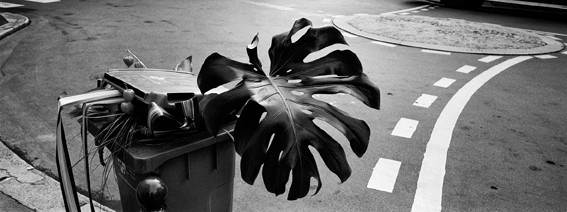Bruno Réquillart
22 Jun - 20 Oct 2013
BRUNO RÉQUILLART
Château de Tours
22 June - 20 October 2013
After Jacques Henri Lartigue, at the Château de Tours, the Jeu de Paume explore a radically different photographic style in the solo show devoted to Bruno Réquillart. The exhibition, conceived in close collaboration with Bruno Réquillart (born in 1947 in Marcq-en-Baroeul), proposes a retrospective survey of his past work and unveils for the first time his work in progress. Made up of 140 prints, the itinerary allows one to understand a procedure composed of gaps and ruptures, but which, paradoxically, reveals an unusual degree of constancy and richness.
However, some points in common link Bruno Réquillart to Jacques Henri Lartigue: the donation to the state during their lifetime of a considerable part of their work, the importance of their own life and the personal in the creative act and, finally, this instinct for the moment or a real foresight for the image.
“Certain photographs, I no longer know which, but I remember the feeling, were born from a sudden turning around. As if a presence, in my back summoned me: it was a photo,” explained Bruno Réquillart in 1994. Indeed, each of his images results from an opening up in face of the event, an acute perception of space and, above all, a rare and rigorous mastery of construction. Bruno Réquillart’s career began in 1968 reporting the libertarian and militant mood of his generation at the time. His encounter with Maurice Béjart and the Ballet du XXe siècle, which he photographed over three years, is emblematic of this. But the photographic experience would soon be pursued by him away from documents and commissions to concentrate on the everyday and the places he knew.
His procedure thus became conceptual, taking up the inventory and accumulation of supposedly insignificant subjects (series called Constats [Records] and show urban elements: iron shutters, advertising panels, tree trunks, etc.): “at the time I had a sort of bulimia for images, I took shots but I didn’t develop my negatives,” he recounts today. But his visual curiosity also reveals a personal story, an introspection, and a need for taking stock. The work, punctuated by a few trips in Europe, stopped suddenly in 1981. Convinced that he was finished with photography, Réquillart devoted himself to painting “to try something else” and soon made a donation to the state (in 1992) of his negatives, his slides and his prints.
After an absence from photography that lasted nearly twenty years, a renewal and return to the practice occurred. Since 2000, he has been photographing the Parisian landscape with the help of a panoramic camera. The town, his living place, is once again scrutinised like an endless visual source but its representation, no doubt due to the format, is enriched by countless details, like numerous microphenomena or anecdotes observed on his promenades.
Château de Tours
22 June - 20 October 2013
After Jacques Henri Lartigue, at the Château de Tours, the Jeu de Paume explore a radically different photographic style in the solo show devoted to Bruno Réquillart. The exhibition, conceived in close collaboration with Bruno Réquillart (born in 1947 in Marcq-en-Baroeul), proposes a retrospective survey of his past work and unveils for the first time his work in progress. Made up of 140 prints, the itinerary allows one to understand a procedure composed of gaps and ruptures, but which, paradoxically, reveals an unusual degree of constancy and richness.
However, some points in common link Bruno Réquillart to Jacques Henri Lartigue: the donation to the state during their lifetime of a considerable part of their work, the importance of their own life and the personal in the creative act and, finally, this instinct for the moment or a real foresight for the image.
“Certain photographs, I no longer know which, but I remember the feeling, were born from a sudden turning around. As if a presence, in my back summoned me: it was a photo,” explained Bruno Réquillart in 1994. Indeed, each of his images results from an opening up in face of the event, an acute perception of space and, above all, a rare and rigorous mastery of construction. Bruno Réquillart’s career began in 1968 reporting the libertarian and militant mood of his generation at the time. His encounter with Maurice Béjart and the Ballet du XXe siècle, which he photographed over three years, is emblematic of this. But the photographic experience would soon be pursued by him away from documents and commissions to concentrate on the everyday and the places he knew.
His procedure thus became conceptual, taking up the inventory and accumulation of supposedly insignificant subjects (series called Constats [Records] and show urban elements: iron shutters, advertising panels, tree trunks, etc.): “at the time I had a sort of bulimia for images, I took shots but I didn’t develop my negatives,” he recounts today. But his visual curiosity also reveals a personal story, an introspection, and a need for taking stock. The work, punctuated by a few trips in Europe, stopped suddenly in 1981. Convinced that he was finished with photography, Réquillart devoted himself to painting “to try something else” and soon made a donation to the state (in 1992) of his negatives, his slides and his prints.
After an absence from photography that lasted nearly twenty years, a renewal and return to the practice occurred. Since 2000, he has been photographing the Parisian landscape with the help of a panoramic camera. The town, his living place, is once again scrutinised like an endless visual source but its representation, no doubt due to the format, is enriched by countless details, like numerous microphenomena or anecdotes observed on his promenades.

